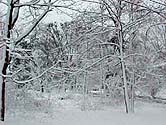- 7 Best Breads for Maintaining Stable Blood Sugar
- Gelatin vs. Collagen: Which is Best for Skin, Nails, and Joints?
- The Long-Term Effects of Daily Turmeric Supplements on Liver Health
- Could Your Grocery Store Meat Be Causing Recurring UTIs?
- Are You Making This Expensive Thermostat Error This Winter?
- Recognizing the Signs of Hypothyroidism
- 10 Strategies to Overcome Insomnia
- Could Artificial Sweeteners Be Aging the Brain Faster?
- Techniques for Soothing Your Nervous System
- Does the Water in Your House Smell Funny? Here’s Why
Winter Depression May Be Less Common Than Believed


SATURDAY, Sept. 7Feel the blues in the winter? You might blame seasonal affective disorder, a form of depression that’s thought to be driven by weather and the time of year. Now, a new study raises questions about whether this condition is as common as researchers have believed.
“It is clear from prior research that seasonal affective disorder exists,” study lead author David Kerr, an assistant professor in the School of Psychological Science at Oregon State University, said in a university news release. “But our research suggests that what we often think of as the winter blues does not affect people nearly as much as we may think.”
Kerr and colleagues analyzed the results from surveys given to more than 550 people in Iowa and more than 200 people in Oregon who answered questions about depression over years. Researchers tried to link the answers to changes in weather conditions, such as the amount of sunlight.
“We found a very small effect during the winter months, but it was much more modest than would be expected if seasonal depression were as common as many people think it is,” Columbia University researcher Jeff Shaman, a study co-author, said in the news release. “We were surprised. With a sample of nearly 800 people and very precise measures of the weather, we expected to see a larger effect.”
People who think they suffer from seasonal affective disorder should get help, Kerr said. Effective treatments include antidepressants, cognitive behavior therapy and exposure to light.
“Fortunately, there are many effective treatments for depression, whether or not it is seasonal,” he said. “Cognitive behavior therapy stands out because it has been shown to keep seasonal affective disorder from returning the next year.”
The study appears in the Journal of Affective Disorders.
More information
For more about seasonal affective disorder, try the U.S. National Library of Medicine.
Source: HealthDay
Copyright © 2026 HealthDay. All rights reserved.










